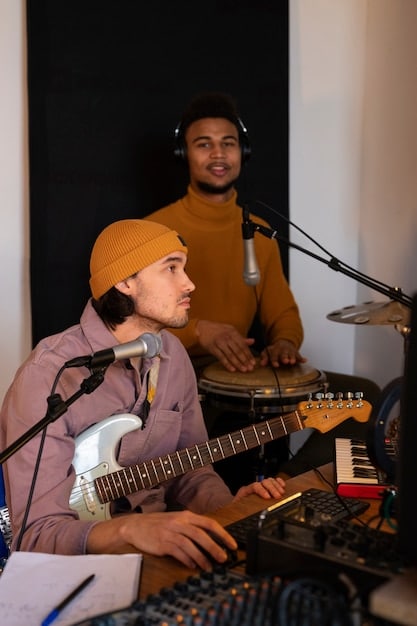Emerging Artists: 3 Proven Strategies for Music Licensing Deals

Emerging artists can secure their first music licensing deal this year by focusing on building a strong catalog, understanding the licensing landscape, and networking strategically with music supervisors and publishers.
For emerging artists: 3 proven strategies to secure your first music licensing deal this Year It can often feel like an uphill battle, but with the right approach, turning your musical passion into a viable career is within reach. Music licensing, the process of granting permission for the use of your music in various media, can be a crucial revenue stream and a significant step in your artistic journey.
Build a Compelling Music Catalog
Creating a strong and diverse music catalog is the foundation for attracting potential licensing opportunities. Music supervisors and publishers are constantly searching for tracks that fit specific moods, genres, and scenes. The broader your catalog, the more likely you are to have something that catches their ear.
Diversify Your Genre
Don’t limit yourself to one genre. Experiment with different styles and tempos to create a wider range of tracks. This increases your chances of appealing to various projects.
Focus on Quality Production
High-quality production is crucial. Invest time and resources in recording, mixing, and mastering your tracks. A polished sound enhances the perceived value of your music.

Here are key elements to create a diverse music catalog that appeals to music supervisors:
- Genre Variety: Produce tracks in different genres to capture a wider audience and increase the chances of your music fitting the perfect scene.
- Theme and Mood Coverage: Be sure to create songs for happy, sad, romantic, and exciting moods. This will ensure your work meets any specification.
- Instrumental Versions: Always have instrumental versions available to open up the possibilities.
Building a versatile music catalog is an ongoing process. Continuously create new music, experiment with different sounds, and refine your production skills. A strong catalog is a valuable asset that will attract licensing opportunities and pave the way for your success.
Understand the Music Licensing Landscape
Navigating the complex world of music licensing can be daunting, but a solid understanding of the process is essential. Knowing the different types of licenses, the parties involved, and the industry standards will empower you to make informed decisions and protect your rights.
Types of Music Licenses
Familiarize yourself with the various types of licenses, including synchronization licenses (for use in films, TV shows, and video games), mechanical licenses (for reproduction of songs), and performance licenses (for public performances).
Key Players in Licensing
Identify the key players in the licensing process, such as music supervisors, publishers, and Performing Rights Organizations (PROs). Understanding their roles and responsibilities will help you target your efforts effectively.

Key areas to consider to build your understanding of the music licensing environment:
- Copyright Laws Know-How: Understand your ownership, how to register your music, and how to protect your work from copyright infringements.
- Pricing Standards Awareness: Research standard rates for different licenses, so you’re able to appropriately negotiate fair prices for your music.
- License Agreement Comprehension: Carefully go through all agreements before signing. Pay close attention to the scope, duration, payment terms, and which conditions need to be met.
Mastering the intricacies of music licensing is a crucial step toward securing deals. By knowing your rights, understanding the process, and building relationships with key players, you’ll be well-equipped to navigate the landscape and negotiate favorable terms.
Strategic Networking and Promotion
Networking and promotion are vital for emerging artists seeking to break into the music licensing world. Building genuine relationships with industry professionals and showcasing your music effectively can significantly increase your visibility and open doors to licensing opportunities.
Target Music Supervisors
Music supervisors are the gatekeepers to many licensing opportunities. Research supervisors who specialize in genres that align with your music and reach out with personalized pitches.
Leverage Online Platforms
Building an online presence on social media platforms such as YouTube, Instagram and Facebook can attract the attention of music supervisors.
Here are a few valuable concepts:
- Industry Events Attendance: Conferences, workshops and industry events will offer networking opportunities and direct access to key players.
- Online Presence Building: Maintain a professional site with your biography and work to reach out to others.
- Feedback Exchange: Ask for feedback to build relationships and gain helpful insight.
Strategic networking and promotion are ongoing efforts. Continuously build relationships, showcase your music, and stay up-to-date on industry trends. With persistence and a genuine passion for your craft, you’ll be well-positioned to secure your first music licensing deal and embark on a fulfilling career.
| Key Point | Brief Description |
|---|---|
| 🎶 Music Quality | High-quality production attracts potential licensing opportunities. |
| 🤝 Networking | Build connections with music managers who value your job |
| 💼 Negotiation | Make sure to agree to the payment and all the fine print. |
Frequently Asked Questions
A music licensing deal grants permission for someone to use your music in a commercial project, such as a film, TV show, or advertisement, in exchange for payment.
Register your music with the U.S. Copyright Office. This creates a public record of your ownership and provides legal recourse if your copyright is infringed upon.
A music supervisor is responsible for selecting and licensing music for films, TV shows, and other media projects. Targeting music supervisors can be a shortcut to licensing deals.
A diverse catalog is extremely important. The more genres and tones you can provide, the more you open yourself up to potentially have licensing deals.
Networking can create a strong foundation for your artist profile. It serves to create contact and potential future clients.
Conclusion
Securing your first music licensing deal is a significant milestone for emerging artists. By building a compelling catalog, understanding the licensing landscape, and networking strategically, you can increase your visibility, attract licensing opportunities, and pave the way for a successful career in the music industry.





